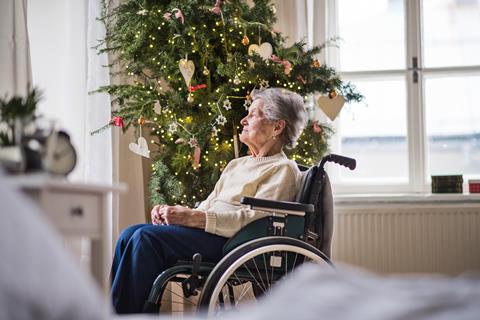During the festive season, we celebrate Jesus coming to a world who did not recognise him. Ben Boland shares his top tips for loving those who may not recognise us either, whether at Christmas or all year round

I will be celebrating Christmas in a secure dementia unit with my dad. We will share a simple meal together and it is unlikely he will remember the occasion or who I am. It will have deep emotional costs for me.
So, why bother?
Because that is what Christmas is all about.
At Christmas, we remember God coming to us, his people; a people who had forgotten him. To quote John 1:10-11: “He [Jesus] was in the world, and though the world was made through him, yet the world did not recognise him. He came to that which was his own, but his own did not receive him.”
Jesus did not become human because we remembered him, He came despite our lack of memory
Note the agency here - God came to us, we who did not recognise him or accept him. Though he had created us in his own image, to be in relationship with him, we neither recognised or accepted him.
Memory problem
When I listen to people describe their Christmas plans, the focus is typically on being with loved ones - often with a focus on children. Children are certainly a gift from God, but they are not the only gift from God.
I find it fascinating that we flock to visit a baby but flee from visiting people with dementia. We say: “She doesn’t remember me”, or: “He won’t even recall my visit tomorrow”, as if their lack of remembering is grounds for us forgetting about them, too.
Yet what baby remembers their visitors?
Jesus did not become human because we remembered him. He came despite our lack of memory. He came to face our rejection. If we choose to forget people living with dementia, who has the memory problem?
Right religion
To paraphrase James: “Religion that God our Father accepts as pure and faultless is this: to look after people living with dementia in their distress and to keep oneself from being polluted by the world” (see James 1:27).
Doing this - putting other’s needs before our own this Christmas - has deep costs but, as disciples, we must follow in the footsteps of our Lord and leader, and share his love with those around us.
Here are three practical tips (TAP) for loving people with dementia this Christmas, and throughout the year:
1. Turn up
It is very hard to have a relationship with someone without spending time with them. Just as Jesus came to us, we need to go to people who are living with dementia. Practically speaking, frequent short visits are often more effective than irregular long ones.
2. Agenda
As Christians, our agenda is always to glorify God and share his love, but often we do this best by loving people enough to let them set the agenda. If they want to talk about the roses in the garden - listen! We do not need to force the agenda - or the conversation - because God is sovereign.
3. Pray
The most powerful way we can love those with dementia is to pray for them. Prayer is the foundation of all Christian ministry. We know that the power to love well and serve others comes not from us but from God. We need to pray for and with people living with dementia - and pray we would love people living with dementia more.





































1 Reader's comment